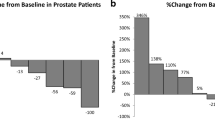Abstract
Paclitaxel and carboplatin upregulate thymidine phosphorylase and thus may provide synergistic antitumor activity in combination with capecitabine (CTX). We, therefore, performed a phase I/II study of CTX. In the phase I study, patients with advanced solid tumors received carboplatin on day 1, paclitaxel on days 1, 8, 15 and capecitabine orally twice a day on days 8–21, every 4 weeks. Phase II patients with advanced adenocarcinoma of unknown primary (ACUP) were treated at the maximal tolerable dose. The phase I study enrolled 29 patients evaluable for dose limiting toxicity. The recommended phase II dose was capecitabine 750 mg/m2 bid, paclitaxel 60 mg/m2/week and carboplatin AUC of 6. There were 9 confirmed responses, 5 partial responses and disease stabilization >3 months in 14 patients. The phase II study was prematurely terminated at 25 patients due to cessation of funding. The objective response rate was 32 % (95 % CI 0.15–0.54), the median progression-free survival 5.5 months (95 % CI 2.8–10.8 months) and the median overall survival 10.8 months (95 % CI 6.0–32.0 months). CTX demonstrated acceptable tolerability and antitumor activity. At the recommended dose level in patients with ACUP, this regimen showed encouraging preliminary activity.


Similar content being viewed by others
References
Miwa M, Ura M, Nishida M, Sawada N, Ishikawa T, Mori K et al (1998) Design of a novel oral fluoropyrimidine carbamate, capecitabine, which generates 5-fluorouracil selectively in tumours by enzymes concentrated in human liver and cancer tissue. Eur J Cancer 34(8):1274–1281
Ishikawa T, Sekiguchi F, Fukase Y, Sawada N, Ishitsuka H (1998) Positive correlation between the efficacy of capecitabine and doxifluridine and the ratio of thymidine phosphorylase to dihydropyrimidine dehydrogenase activities in tumors in human cancer xenografts. Cancer Res 58(4):685–690
Eda H, Fujimoto K, Watanabe S, Ura M, Hino A, Tanaka Y et al (1993) Cytokines induce thymidine phosphorylase expression in tumor cells and make them more susceptible to 5′-deoxy-5-fluorouridine. Cancer Chemother Pharmacol 32(5):333–338
Sawada N, Ishikawa T, Fukase Y, Nishida M, Yoshikubo T, Ishitsuka H (1998) Induction of thymidine phosphorylase activity and enhancement of capecitabine efficacy by taxol/taxotere in human cancer xenografts. Clin Cancer Res 4(4):1013–1019
Villalona-Calero MA, Weiss GR, Burris HA, Kraynak M, Rodrigues G, Drengler RL et al (1999) Phase I and pharmacokinetic study of the oral fluoropyrimidine capecitabine in combination with paclitaxel in patients with advanced solid malignancies. J Clin Oncol 17(6):1915–1925
Villalona-Calero MA, Blum JL, Jones SE, Diab S, Elledge R, Khoury P et al (2001) A phase I and pharmacologic study of capecitabine and paclitaxel in breast cancer patients. Ann Oncol 12(5):605–614
Batista N, Perez-Manga G, Constenla M, Ruiz A, Carabantes F, Castellanos J et al (2004) Phase II study of capecitabine in combination with paclitaxel in patients with anthracycline-pretreated advanced/metastatic breast cancer. Br J Cancer 90(9):1740–1746
Benson AB. NCCN practice guidelines in Oncology-v.2.2020, 2010 [updated August 13, 2010; cited 2010 December, 11th]. 64]. Available from: https://urldefense.proofpoint.com/v1/url?u=http://www.nccn.org/professionals/physician_gls/PDF/hepatobiliary.pdf&k=ux7ohqYFcw1oDo0gOpSLlw%3D%3D%0A&r=UbmibQFmfYpeICw9U5pTPJzUWGxSLHJd7zX9XiGtctk%3D%0A&m=pjFYkemH793aikdv8k6btkIbOaLgMln0Tji0H1VIIJk%3D%0A&s=b2bfd8a0d7cbff133bd164252aedadd205bde5cda51fcc73913ca3054a65aa8b
Hainsworth JD, Rubin MS, Spigel DR, Boccia RV, Raby S, Quinn R et al (2013) Molecular gene expression profiling to predict the tissue of origin and direct site-specific therapy in patients with carcinoma of unknown primary site: a prospective trial of the Sarah Cannon Research Institute. J Clin Oncol 31(2):217–223
Hainsworth JD, Daugaard G, Lesimple T, Hubner G, Greco FA, Stahl MJ et al (2015) Paclitaxel/carboplatin with or without belinostat as empiric first-line treatment for patients with carcinoma of unknown primary site: A randomized, phase 2 trial. Cancer 121(10):1654–1661
Hainsworth JD, Burris HA III, Erland JB, Morrissey LH, Meluch AA, Kalman LA et al (1999) Phase I/II trial of paclitaxel by 1-hour infusion, carboplatin, and gemcitabine in the treatment of patients with advanced nonsmall cell lung carcinoma. Cancer 85(6):1269-1276
Hainsworth JD, Spigel DR, Clark BL, Shipley D, Thompson DS, Farley C et al (2010) Paclitaxel/carboplatin/etoposide versus gemcitabine/irinotecan in the first-line treatment of patients with carcinoma of unknown primary site: a randomized, phase III Sarah Cannon Oncology Research Consortium Trial. Cancer J 16(1):70–75
Belani CP (2001) Interim analysis of a phase II study of induction weekly paclitaxel/carboplatin regimens followed by maintenance weekly paclitaxel for advanced and metastatic non-small cell lung cancer. Semin Oncol 28(4 Suppl 14):14–16
Pavlidis N, Pentheroudakis G (2012) Cancer of unknown primary site. Lancet 379(9824):1428–1435
Greco FA, Pavlidis N (2009) Treatment for patients with unknown primary carcinoma and unfavorable prognostic factors. Semin Oncol 36(1):65–74
Meropol NJ, Gold PJ, Diasio RB, Andria M, Dhami M, Godfrey T et al (2006) Thymidine phosphorylase expression is associated with response to capecitabine plus irinotecan in patients with metastatic colorectal cancer. J Clin Oncol 24(25):4069–4077
Salonga D, Danenberg KD, Johnson M, Metzger R, Groshen S, Tsao-Wei DD et al (2000) Colorectal tumors responding to 5-fluorouracil have low gene expression levels of dihydropyrimidine dehydrogenase, thymidylate synthase, and thymidine phosphorylase. Clin Cancer Res 6(4):1322–1327
Bendardaf R, Lamlum H, Elzagheid A, Ristamaki R, Pyrhonen S (2005) Thymidylate synthase expression levels: a prognostic and predictive role in advanced colorectal cancer. Oncol Rep 14(3):657–662
Aschele C, Lonardi S, Monfardini S (2002) Thymidylate synthase expression as a predictor of clinical response to fluoropyrimidine-based chemotherapy in advanced colorectal cancer. Cancer Treat Rev 28(1):27–47
Acknowledgments
We thank Dr. Christopher Roberts and Ms. Kathleen Sergott for providing detection reagents for immunohistochemistry for TP, TS, DPD. This trial has been registered at clinicaltrials.gov (registration identifer: NCT00201734). Registration Date: September 12, 2005.
Funding
Roche provided funding for the trial. The funding source did not influence the methodology, conduct of the trial, analysis or reporting of the results.
Author information
Authors and Affiliations
Corresponding author
Ethics declarations
Conflict of interest
The authors report no relevant competing conflicts of interest.
Additional information
Sameh Mikhail and Maryam B. Lustberg are primary authors with equal contribution.
Miguel Villalona-Calero and Tanios Bekaii-Saab are senior authors with equal contribution.
Rights and permissions
About this article
Cite this article
Mikhail, S., Lustberg, M.B., Ruppert, A.S. et al. Biomodulation of capecitabine by paclitaxel and carboplatin in advanced solid tumors and adenocarcinoma of unknown primary. Cancer Chemother Pharmacol 76, 1005–1012 (2015). https://doi.org/10.1007/s00280-015-2877-6
Received:
Accepted:
Published:
Issue Date:
DOI: https://doi.org/10.1007/s00280-015-2877-6




